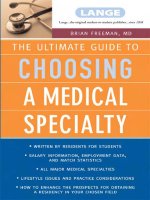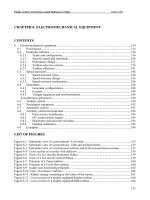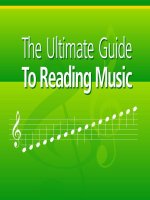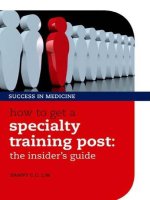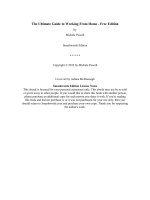IELTS speaking strategies: the ultimate guide with tips, tricks, and practice on how to get a target band score of 8 0+ in 10 minutes a day
Bạn đang xem bản rút gọn của tài liệu. Xem và tải ngay bản đầy đủ của tài liệu tại đây (1.29 MB, 161 trang )
IELTSXpress.com
IELTS SPEAKING STRATEGIES
The Ultimate Guide with Tips, Tricks, and Practice on How to Get a Target Band
Score of 8.0+ In 10 Minutes a Day
-- By Rachel Mitchell --
IELTSXpress.com
Text Copyright © by Rachel Mitchell
All rights reserved. No part of this guide may be reproduced in any form without
permission in writing from the publisher except in the case of brief quotations
embodied in critical articles or reviews.
Legal & Disclaimer
The information contained in this book and its contents is not designed to
replace or take the place of any form of medical or professional advice; and is
not meant to replace the need for independent medical, financial, legal or other
professional advice or services, as may be required. The content and information
in this book have been provided for educational and entertainment purposes
only.
The content and information contained in this book have been compiled from
sources deemed reliable, and it is accurate to the best of the Author's knowledge,
information, and belief. However, the Author cannot guarantee its accuracy and
validity and cannot be held liable for any errors and/or omissions. Further,
changes are periodically made to this book as and when needed. Where
appropriate and/or necessary, you must consult a professional (including but not
limited to your doctor, attorney, financial advisor or such other professional
advisor) before using any of the suggested remedies, techniques, or information
in this book .
Upon using the contents and information contained in this book, you agree to
hold harmless the Author from and against any damages, costs, and expenses,
including any legal fees potentially resulting from the application of any of the
information provided by this book. This disclaimer applies to any loss, damages
or injury caused by the use and application, whether directly or indirectly, of any
advice or information presented, whether for breach of contract, tort, negligence,
personal injury, criminal intent, or under any other cause of action.
You agree to accept all risks of using the information presented inside this book.
You agree that by continuing to read this book, where appropriate and/or
necessary, you shall consult a professional (including but not limited to your
doctor, attorney, or financial advisor or such other advisor as needed) before
using any of the suggested remedies, techniques, or information in this book.
IELTSXpress.com
Table of Contents
Introduction
Ielts Speaking Introduction
Part 1 Speaking Topics
What Will Give You A High Score In The Speaking Part 1?
How Does The Examiner Mark Your Speaking Test?
Part 1 Speaking Essentials
Fluency Markers
Time And Frequency Expressions
Adverbials For Giving Opinions
Part 1 Speaking Practice
Preference Questions
Part 1 Speaking Model Answers
List Of Part 1 Speaking Questions To Practice At Home
Part 2 Speaking Introduction
Part 2 Speaking Tips
People Description
Adjectives Of Personality
People Description Model Answer
Model Sentences For People Description
Place Description
Adjectives For Describing Places
Place Description Model Answer
IELTSXpress.com
Model Sentences For Place Description
Object Description
Useful Adjectives For Describing Objects
Object Description Model Answer
Model Sentences For Object Description
Past Event Description
Past Event Description Model Answer
Model Sentences For Past Event Description
Part 3 Speaking Introduction
Language For Giving And Supporting Opinions
Practice Questions
Talking About Advantages And Disadvantages
Hypotheticals
Practice Questions
Proposing Solutions To Problem
Practice Questions
Agreeing And Disagreeing
Language For Expressing Likelihood
The Future Perfect & The Future Continuou s
Practice Questions
Model Sentences For Part 3 Speaking
Part 3 Speaking Questions For Practice
Friendship
IELTSXpress.com
Successful People
Advertisement
Teaching
Advice
Adventurous People
Animals
Cell Phones
Computers
Fashion & Shopping
Gifts
Transportation
Photography
Music
Films
Sports
Food
Tv Programmes
Relaxation
Newspapers And Magazines
Parties
Travelling
Noise
Reading
Festivals
Parks
Conclusion
Check Out Other Books
IELTSXpress.com
INTRODUCTION
Thank you and congratulate you for downloading the book “IELTS Speaking
Strategies: The Ultimate Guide with Tips, Tricks and Practice on How to Get a
Target Band Score of 8.0+ in 10 Minutes a Day.”
This book is well designed and written by an experienced native teacher from
the USA who has been teaching IELTS for over 10 years. She really is the expert
in training IELTS for students at each level. In this book, she will provide you all
proven Formulas, Tips, Tricks, Strategies, Explanations, Structures, Part 1 + Part
2 + Part 3 Speaking Language, Vocabulary and Model Part 1 + Part 2 + Part 3
Answers to help you easily achieve an 8.0+ in the IELTS Speaking, even if your
speaking is not excellent. This book will also walk you through step-by-step on
how to develop your well-organized answers for the Part 1 + Part 2 + Part 3
Speaking; clearly analyze and explain the different types of questions that are
asked for the IELTS Speaking Test; provide you step-by-step instructions on
how to answer each type of question excellently.
As the author of this book, Rachel Mitchell believes that this book will be an
indispensable reference and trusted guide for you who may want to maximize
your band score in IELTS Speaking. Once you read this book, I guarantee you
that you will have learned an extraordinarily wide range of useful, and practical
IELTS Part 1 + Part 2 + Part 3 Speaking strategies and formulas that will help
you become a successful IELTS taker as well as you will even become a
successful English user in work and in life within a short period of time only.
Take action today and start getting better scores tomorrow!
Thank you again for purchasing this book, and I hope you enjoy it.
IELTSXpress.com
IELTS SPEAKING INTRODUCTION
The IELTS speaking test lasts about 11 to 14 minutes. It has 3 parts, and it’s
worth 25% of your IELTS score .
However, the speaking test is very unique because it’s much shorter than the
other sections. Specifically, writing test (1 hour), listening test (45 minutes),
reading (1 hour), and speaking test (11-14 minutes).
The IELTS speaking test is shorter but it gives you more opportunities to
practice more basic skills.
Let’s talk about the three parts of the speaking test.
IELTSXpress.com
PART 1 SPEAKING TOPICS
The skills in part 1 speaking are exactly the skills that we need for part 2 and
part 3 speaking. So what we need to do in part 1 speaking is we need to focus on
building basic skills.
There are two purposes to part 1 speaking. The first purpose is to calm you down
. They know that you are nervous, so they’re going to ask you simple questions
that get you settle down and prepare for part 2 & part 3 speaking (the more
difficult parts). The second purpose of part 1 speaking is of course for you to
show the examiner your ability to speak English . They want you to calm down
and they want you to show the most you can do with your English.
In part 1 speaking, the questions are about you , your home , your life , your
family , or your country , which are things that you have the answer to. They
are not asking you questions like “who wants to be a billionaire?”, “who was
the 15 th president of the United States?” . Normally, in part 1 speaking, they will
be giving you 3 topics:
The 1 st topic: The first topic will always be “do you work or do you study?” or
“where you are living?”
If you answer that you are working , then they will ask you about your work .
If you answer that you are studying , then they will ask you about your study .
The next 2 nd and 3 rd topics: The next 2nd and 3rd topics can be about anything
, but it is not going to be a sensitive topic; they are not going to ask you about
politics. Instead, they will ask you something about general topics that you have
ideas to answer . These things might be about rain , for example, how often does
it rain in your country? Or how do you feel when it rains? . They also might ask
you questions about movies, colors, hobbies, etc . These are simple questions,
they are not challenging questions, but we cannot easily predict what the
examiner will be asking you about.
Here is the thing. The examiner doesn’t care about your answer. If they ask you
“do you like to read?” they don’t care if you say “yes, I love reading” or “no, I
hate it” . They don’t care, they want to hear how you communicate .
IELTSXpress.com
WHAT WILL GIVE YOU A HIGH SCORE IN THE
SPEAKING PART 1?
Rule Number 1: Answer the question . Make sure you answer the question.
For example: do you like to read books?
Well, books are really enjoyable. People like to read books because they find it
very relaxing, and they can get a lot of information from books. My father really
enjoys reading; and every Friday night, he sits at home with a book and drinks
some tea….
Am I answering the question? No, I am not.
Definitely, the examiner does know that I did not answer the question because I
chose not to. I didn’t answer the question.
Rule Number 2: you need to show the examiner something or some things
about your English ability , and that can be something about your grammar,
something about your vocabulary, something about the organization of your
answer, and maybe something about your pronunciation.
We must know that IELTS is a game, and a test is a method with rules that
allows you to gain points and lose points. Therefore, in order to be successful
with any game and IELTS in particular, we need to know what the rules are , and
we need to know how to gain points, not lose points .
Example: “Do you enjoy reading?”
Answer 1: Yes, I love to read
Answer 2: To be honest, I hate reading. I think it’s a stupid hobby. I think people
that read are actually very boring and they annoy me tremendously.
Which answer is better? The first one or the second one? Of course, the second
one . Even though the second answer is a bit strange, a bit rude, but that’s not
what the examiner will mark in the IELTS exam. Good vocabulary, good
grammar, good sentence structures; that is what they mark. So, show the
examiner your English ability.
Note that never give a one-word answer , always use complete sentences or at
IELTSXpress.com
least complete phrases , and extend your answer by providing some kinds of
explanations or descriptions .
For example: “Do you enjoy reading?”
Answer: “ yes”
Well, if you just give a one-word answer like this, you’ve got nothing with your
pronunciation, nothing with your vocabulary, and nothing with your grammar.
You’ve got nothing.
What you need to do is you need to extend your answer . The big mistake of part
1 speaking that a lot of people make is that they lose sight over how important it
is . In fact, speaking part 1 is quite easy . However, most people tend to expect
something more difficult in part 1 speaking such as, “please get me the harder
questions? Or “please get me the good questions?” . But no , the questions they
give you in part 1 speaking are already the good stuff, and you will see that the
way you answer questions in part 1 speaking is exactly what you need for part 2
and part 3 speaking . Therefore, you need to be willing to practice questions for
part 1 speaking.
IELTSXpress.com
HOW DOES THE EXAMINER MARK YOUR
SPEAKING TEST?
You need to know and understand the four categories. Let’s take a look at the
IELTS speaking band descriptors as below:
1. FLUENCY AND COHESION: The first category that the examiner is
marking your speaking is the fluency and cohesion. They will be marking you
on:
·
·
·
Do you speak smoothly without long pauses ?
Do you produce new information ?
Do you link your ideas by using fluency markers ?
IELTSXpress.com
Fluency markers are words like “however”, “furthermore”, “also”, “as a
result”, “consequently”, “so”, “unfortunately”, “for example”, etc.
You should be fluent not only in part 1 speaking, but also in part 2 and part 3
speaking.
Note that fluency is not speed (not too fast and not too slow ). Unfortunately,
some students are going to hurt their score when they try to speak too fast
because their mouth is going too fast to their brain.
2. LEXICAL RESOURCE (VOCABULARY): The second category that we
should think about is Lexical Resource. You will be doing a lot of vocabularies
in your IELTS speaking:
+ You should use linking vocabulary . You should use words that signal such
as therefore, so, for example, nowadays, unfortunately, surprisingly, etc.
+ You should use topic vocabulary : vocabulary that we will use for particular
topics, for example, topics about television, movies and books, technology, etc.
+ You should use phrasal verbs such as , look into, look onto, etc.
+ You should use a range of words. You don’t just want to say “it’s really good”
or “it’s good” , or “everything is good” . You should make your answer better
by using a range of synonym words of “good” . You can use “fantastic/
spectacular/awesome/tremendous, etc.”
+ You will not get a high score unless you use a wide range of vocabulary
accurately , and you do some simple things like “ paraphrasing ” .
Paraphrasing is when you change the words that they ask you in the question.
For example, if they ask you “do you like to read?” You should not say “yes, I
love to read.” Although your grammar is ok, but if you want to get a better score
you should say “yes, I love reading” . Certainly, you will get a better score
because you have changed the verb form. Or you can say “yes, I love doing
that” .
When you start to learn vocabulary words, it’s really good to build vocabulary as
you keep going, as you keep studying, but you don’t have to sit down and try to
study about 20 vocabulary words. Instead of doing that, it’s better if you try to
only learn may be 1 or 2 words at a time, and then immediately start using the
words. Don’t learn a list of 10 words, and then think “oh, I’ve just learnt the 10
IELTSXpress.com
words” . You shouldn’t do that. What you should do is to learn 2 words a day
and start using those words right away by using those words often in sentences,
then you will find that you learn words more deeply, and the more you do it, the
quicker your brain processes new vocabulary.
Idioms: The other thing you should do if you want to get a higher score (7.0+) is
that you need to be able to use a range of idioms . Idioms are phrases that don’t
mean exactly what they sound what they mean , for example, “raining cats and
dogs”, “become green with envy”, “cost an arm and a leg”, “ sleep like a
baby” . Idioms are very challenging, and this is the one thing that almost
students do not use in the final test. Why? Remember that when the examiner
asks you certain questions, they are inviting certain answers. For example, if
they ask you “ would you like to travel to another country?”
Note that, if the examiner asks you a question with the modal verb “would” ,
they are inviting you to give them an answer using a modal verb back, but there
are no questions that the examiner asks you to give them an idiom. You have to
create the opportunity to use idioms . You have to be confident enough in your
English, quick enough with your vocabulary to be able to use idioms properly.
Use idiomatic expressions and phrasal verbs for accurate collocations. The best
way to learn phrases is reading . Reading will help you learn idiomatic
expressions and phrasal verbs for accurate collocations effectively. Reading will
help you improve your writing score, listening score, and even your speaking
score. These are things that you need to be aware of.
I don’t expect you to learn all of English idioms. I only expect you to learn a
handle of them (5-6-7-8 idioms) that you know perfectly; that you think you are
able to use them perfectly in the exam.
The use of idioms is a high-level skill. Using them properly, not overusing them.
Try to paraphrase as much as you can and use idioms in your speaking. Use
fluency markers that you talk about.
You can boost your vocabulary by using paraphrasing, using idioms and you can
improve your pronunciation. You can get up to 7.0+ with your pronunciation in 3
months if you practice your pronunciation every day.
LIST OF USEFUL IDIOMS:
IELTSXpress.com
It’s as easy as pie = it’s a piece of cake: to be very easy, (not complicated).
I don't think it's as easy as pie to get band 8.5 in the IELTS speaking test.
It's a piece of cake to drive this car.
Cost an arm and a leg: to be very expensive.
The movie is interesting, but the tickets cost an arm and a leg .
The car cost him an arm and a leg .
Pay through the nose: to pay too much for something.
I usually have to pay through the nose for parking a car if I bring it into the
city.
He paid through the nose to get the car fixed.
Make someone blue = bump someone out : to make someone sad or sick.
It made him blue to have to stay home with his wife all day.
He made his girlfriend blue yesterday.
Freak out : to become very angry or lose control of your mind because of
somebody or something.
I freaked out when I saw her with another man.
Snakes really freaked me out .
In the nick of time : just before it's too late/ at the last possible moment.
We got to the airport just in the nick of time .
I arrived at the train station in the nick of time .
She finished her English essay just in the nick of time .
It’s raining cats and dogs: it’s raining a lot/ it is raining heavily.
It's windy and is raining cats and dogs .
IELTSXpress.com
It was raining cats and dogs , so all flights were delayed.
(Like) two peas in a pod : very similar, especially in appearance.
Peter and his brother are like two peas in a pod .
The twins are like two peas in a pod .
(As) sly as a fox : someone who is clever, cunning, wily, and tricky.
Many people don't like him because he is sly as a fox .
My boss is as sly as a fox .
Poke around : look around a place, typically in search of something (you can
poke around on the internet, you can poke around on the streets, etc. to look
for/search for something).
Just poke around the Internet, you'll find a lot of dating websites.
He poked around in his desk to see if the wallet was there.
Mean business: to be very, very serious.
I thought he was joking at first, but then I saw that he really meant business
.
Just looking at him, I knew he meant business .
Hit the hay = hit the sack : to go to bed.
I'm pretty tired. I think it's time for me to hit the hay .
I'm going to hit the sack early since I’ve got to get up early tomorrow.
Sleep like a baby: to sleep very well; to sleep deeply.
After a long, hard day at work, I slept like a baby last night.
He was very tired, so he went to bed, and slept like a baby .
Once in a blue moon: very rarely/very seldom/almost never.
IELTSXpress.com
My son lives in Canada and he only comes to see us once in a blue moon .
My family used to live in Tokyo, but now we only go there once in a blue
moon .
Ace a test: to do very well in a test/ to get a very high score on a test.
You need to study hard to ace a test .
She had actually aced a test in Math, a subject that had never come easily
for her.
Ring a bell: to sound familiar.
The name Lucy doesn't ring a bell .
I've never met Sarah, but her name rings a bell .
Green with envy: to be jealous/ to be envious.
Tom was green with envy when he saw that I got a new car for my birthday.
My expensive house makes him green with envy .
Drive someone crazy: to make him or her upset or annoyed.
Tom quit his job because his boss drove him crazy every time he went to
work.
The constant noise drove me crazy .
The cat that ate the canary: to look very happy/ very pleased.
He was smiling like the cat that ate the canary .
You look like the cat that ate the canary .
3. GRAMMAR:
Pay attention to a grammatical range of accuracy.
·
·
Are you making mistakes?
How many mistakes are you making?
IELTSXpress.com
·
Are those mistakes reducing the examiner’s ability to be able to
understand you?
That’s the key .
Forget about being perfect, you’re not going to be perfect. Don’t chase
perfection, you never get it. So, what can you do? Well, I would say that you
should focus on the big mistakes that you are making usually. Those are verb
tenses , article and adjectives like “I felt so bored (not boring ). Something like
that.
Another thing you need to pay your attention to is that subject-verb agreement .
My father has (not have ) a motorbike.
4. PRONUNCIATION
Pronunciation is probably the thing you use the most. The fact about
pronunciation is that a lot of you need to know how badly it destroys your band
score even though your grammar and vocabulary are good. It really does. It kills.
So you need to spend time practicing your pronunciation. Pronunciation is by far
the easiest thing for you to fix in your English.
Note that pronunciation is 100% physical .
What is a word ?
A word is a collection of sounds. For example, the word “MIXED” is a
collection of the sounds “M.I.K.S.T”
The problem is that you don’t know where the sounds are, you don’t know how
to make the sounds and you don’t do it enough. So try to practice your
pronunciation enough.
How to be good at pronunciation?
One of the reasons my pronunciation is so clear is that I have focused years for
years on finishing my sounds (like , because ). My pronunciation is not
accidentally clear, my pronunciation is clear by being designed because I am
extremely precise with every sound that I have made. You can learn the same
thing. It’s not magic, it’s not intelligent, it’s just focused , focused and focused .
You have to be precise, and you have to practice pronunciation often.
IELTSXpress.com
Work at it every day. Don’t try to pronounce the words too fast.
IELTSXpress.com
PART 1 SPEAKING ESSENTIALS
What does the word “essential” mean? It means “very important, highly
critical, necessary”
The skills that you learn for part 1 speaking are 100% the foundation of part 2
and part 3 speaking. If you do a poor job in part 1 speaking, the examiner will be
supposed to give you just a 5.0 before you have done part 2 & part 3 speaking.
When it comes to part 1 speaking, I would say that you need to remember these
things:
Number 1: Never answer with only one word . Always use complete sentences
or phrases .
If they ask you “do you like to read?”
If you just say: yes
Well, your answer has no grammar, no pronunciation, no vocabulary. All they
know is “you like to read”.
What is the better answer of “do you like to read?”
Answer: Yes, I would love to…
Or: no, reading is boring. I think that people who read are quite stupid.
Frankly, I think they should be doing more fun things like motorbike racing or
knife fighting…
This answer is better . You might disagree because the answer sounds a bit rude,
and it talks a lot about a bad lifestyle (motorbike racing, knife fighting).
However, the examiner is not going to give you a band score based on how nice
a person you are, they will give you a band score based on your English ability.
So be sure that you give them what they want.
Number 2: you need to show the examiner something or some things about your
English, and that can be something about your grammar, something about your
vocabulary, something about the organization of your answer, and maybe
something about your pronunciation.
For example, if they ask you “do you like watching TV?”
IELTSXpress.com
And you say: of course, I love watching TV.
When you say “I love...” you stressed the word “love” . That means you’ve
shown something about your pronunciation.
These are things you need to think about: answer the question and extend your
answer . Show something about your English ability. For each question, try to
produce your answer in different ways to show different things about your
speaking. There are some basic things you can do right away. First of all, you
add details by using those basic questions in English: “who”, “what”, “when”,
“where”, “why”, “how”, “how often”, “how much”, etc.
So if they ask you “do you like watching TV?”
You can say: Yes, I love watching TV. I really love Mr. Bean. He is my favorite
TV character. I often watch TV with my family in the living room on the weekend.
Or if they ask you “do you like reading books?”
You can say: yes, I really love reading books mainly because it’s so relaxing. I
remember when I was in high school, my teacher gave me a really good book
and inspired me to read more and more.
Before answering the question, make sure you pay attention to the question type,
the verb tense (“ do you like to read?” or “ did you like to read when you were a
child?” Or “what book would you like to read?”) . Be careful about this.
For example: “Do you like reading books?”
What’s the verb tense of this question? Present tense.
Answer: Yes, I really love reading books mainly because it’s so relaxing. I
remember when I was in high school, my teacher gave me a really good book and
inspired me to read more and more .
Did I answer the question?
Yes , and then I switched from present tense to past tense . That is something else
you can do. You can do a lot of things when it comes to extending your answer;
you can use non-defining relative clauses to add extra information about anything
you want to say. So think about this.
IELTSXpress.com
I can say “I really enjoy reading comic books. These books are very
entertaining.” (2 sentences)
But I can combine them and make 1 sentence by using a non-defining relative
clause .
“I really love reading comic books, which are very entertaining.”
Like I said, you can change the verb tense.
If they ask you “did you enjoy reading books when you were a child?”
What’s the verb tense of this question? Past tense , right?
So, be sure you answer the question, but go ahead and switch the verb tense if
you want.
You can say: To be honest, I didn’t really like reading so much when I was a kid .
But nowadays, I’m pretty keen on reading mystery novels. Actually, I’m going to
the bookstore after the class tonight, and I’ll buy some mystery novels.
So I just gave the examiner the answer using past tense , present tense and future
tense .
You can use the adverbs of frequency . You can talk about how often or how
rarely you do something. Use a range adverbs of frequency and be careful not
just giving the adverb back to the examiner.
For example, if they ask you “what do you usually do on the weekend?”
You shouldn’t say: on the weekend, I usually .
That’s fine, proper grammar, but if you want to get a high score, you should
change “usually” into “frequently” or “often” . You should paraphrase it .
Stay away from using 100% and 0% statement like always, never , etc.
Example 1: “What do you do on the weekend?”
Answer: I always go to the mall and talk to everyone
“ Always go to the mall?” does this sound like accurate communication? Is it
possible to always go the mall every weekend ? That sounds a little strange .
IELTSXpress.com
Example 2: “What do you do on the weekend?”
Answer: I always do my homework.
Never have a weekend off? Always to 100% of the time on the weekend you do
your homework? That doesn’t sound like accurate .
Example 3: “do you like fast food?”
Answer: To be honest, it’s disgusting, I never eat it.
Never eat fast food? That doesn’t sound like accurate .
So I would say that you should be very careful of using these adverbs of
frequency always and never in your answers.
Paraphrasing: you can use synonyms and parallel expressions to paraphrase
the question in your answer.
For example, if they ask you “what did you like to read as a child?”
It’s very easy to get into the bad habit if you say “As a child, I like to read .”
Your grammar is ok, however, your vocabulary score is low because you didn’t
show the examiner your vocabulary , you borrowed his vocabulary, and you used
it in your answer.
So if they ask you “what did you like to read as a child?”
You should paraphrase your answer like “ when I was a kid, I love reading…”
it’s much better.
Or you can say “back then, I enjoyed reading… ”
“Back then” in this case means “when I was a child”
Or you can paraphrase your answer by saying: Yes, I love it. In fact, I have enjoye
reading . I have been reading mystery novels when I was a teenager. (I used
present, present perfect, present perfect continuous in my answer).
Let me give you another example here.
If they ask you “what do you do in your free time?”
IELTSXpress.com
You should paraphrase your answer by saying: “ In my leisure time/ in my spare
time , I love to play games…”
Or you can say “when I am not working , I like to read books.”
Or you can say “well, one of my hobbies is fishing.”
Paraphrasing statements about favorite things/people
If they ask you “ What’s your favorite food to eat?”
If you answer like this “My favorite food definitely is X because…” , you will
not get a high score because you don’t paraphrase .
Instead, you can use this structure “ The X I love the most is…” to answer this
question “what’s your favorite X…?”
Example: what’s your favorite TV show?
You can say: The TV show I love the most is…
What is your favorite place to visit?
You can say: The city I love the most is New York…
So you need to practice this structure, because if the examiner gives you a
“favorite” question, then you know how to answer it excellently.
On the other hand, if they ask you “What’s your least favorite food to eat?
You would say: The X I love the least is… or I really dislike…
“What’s your least favorite food to eat ?
You can say: Well, the food I love the least is Kimchi, I generally don’t like
Korean food….
Synonyms for Like and Dislike to paraphrase the questions:
LIKE:
Like, to be keen on, to be fond of, to be captivated by, to be fascinated by, to be
tempted by, fancy, to be attracted to, to be passionate about.
IELTSXpress.com
DISLIKE:
Dislike, to be not keen on, to be not fond of, detest, hate, loathe, can’t stand,
can’t bear, to be not captivated by.
Summary: You will not get a high score (7.0+) if you don’t paraphrase your
answer. You have to do it. You might be going to be slow at first. I know this,
but the more you practice your paraphrasing, the easier it will get. You will be
programmed like a computer.
Comparison: You can answer the question by using comparison language .
Comparison language is so useful. This is something the examiner is expecting
you to be able to do. They want you to be able to compare things. What to
compare? Compare what you want, many things you can compare.
Do you like to read? Compare what you like to read with what you don’t like to
read . Compare what you like to read now with what you used to like to read
when you were a child .
Compare what you like to read now with what you would like to read in the
future .
Compare what you like to read with what your friends/your parents/people in
your country like to read .
If the examiner gives you a question with one to two choices . They are inviting
you to do something, they are hoping that you will be giving them a certain kind
of language.
·
·
·
Would you rather own a dog or a cat as a bet?
Do you prefer reading books or magazines?
Do you like eating fast food or traditional food?
First of all, you are going to PARAPHRASE . If they ask you “Would you
rather…?” , you are going to answer “I would prefer to…”
Example: Would you rather own a dog or a cat as a pet?
Your answer should be “I would prefer to own a dog/ I would prefer to own a cat
If they ask you “Would you prefer to own a dog or a cat as a bet?”
IELTSXpress.com

